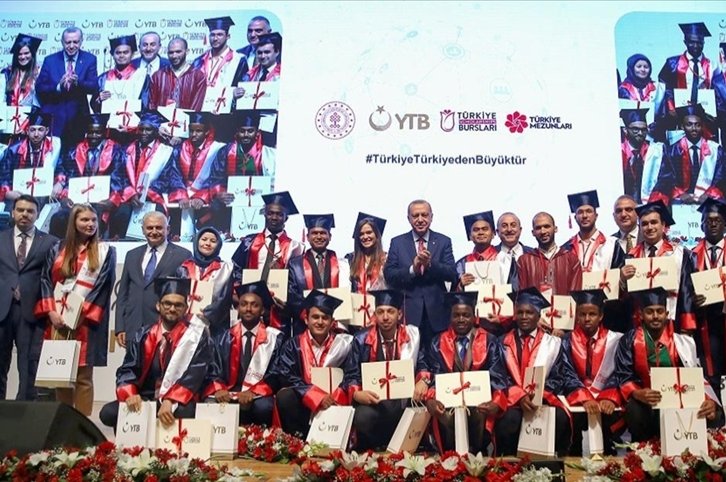
As Turkey's clout in Africa grows, the Presidency of Turks Abroad and Related Communities is at the center of the country's efforts to prioritize a humanitarian approach to the continent's development, working in fields from education to boosting cultural ties
Turkey relies on its humanitarian approach to boost its ties with African countries for its "Africa opening." The country, which will host its third Turkey-Africa Partnership Summit on Thursday where top figures of African countries and Turkish officials will convene, credits the work of a Culture and Tourism Ministry subsidiary for winning the hearts and minds of the African public. The Presidency of Turks Abroad and Related Communities (YTB) is part of Turkey's multi-pronged foreign policy toward Africa, working to empower relations, in fields from trade to political dialogue, from education to investments.
The YTB is behind diverse projects to boost political, humanitarian, economic and cultural ties and "human resources" to build the future of the continent, the YTB said in a written statement Wednesday.
The Presidency said that Turkey was pursuing a more active foreign policy toward African countries whose importance in the world system has elevated in recent years, pointing to the first edition of the Turkey-Africa summit in 2008. The YTB will be among the participants of the latest edition.
The organization's most renowned activity is Türkiye Scholarships, which provides grants to foreign students attending Turkish universities. Along with the scholarship program, the YTB supports foreign students' alumni associations with the purpose of the prevalence of ties with graduates viewed as "envoys" to improve relations between their countries and Turkey. Between 2012 and 2021, 12,600 students from 54 African countries are provided with grants from the scholarship program. So far, 3,029 students from 54 African countries who benefited from the scholarships have graduated from Turkish universities. The YTB helped to establish 13 alumni associations for those graduates in 12 African countries. The Presidency also organizes reunion events for graduates in Turkey and helps graduates keep in touch, both with each other and Turkey. In recent years, it also organized events bringing together the alumni of Turkish universities with Turkish businesspeople in an effort to explore commercial relations between Turkey and African countries.
The African alumni also benefit from programs organized by the YTB in their countries to develop their vocational skills. This year, in cooperation with Anadolu Agency (AA), the YTB trained alumni who graduated from journalism programs in Turkey on "Next Generation Media." AA and the YTB also cooperated for training journalists from African countries in another project in 2019 and 2021.
On the cultural side of ties, The Presidency runs workshops on Turkish heritage in North Africa, a think-tank forum and a Global Somali Diaspora workshop. In addition, the YTB provides Turkish language classes for African diplomats, public officials, soldiers and academics as part of a scholarship program.
In 2019, the YTB organized "idea workshops," which hosted youth from North African countries in Turkey on a platform where they exchanged ideas and discussed solutions to challenges their countries faced. In September, the YTB signed a cooperation protocol with the African Union in a bid to bolster joint work on diaspora affairs, higher learning, language education and academic studies.
More cultural centers
Along with the YTB, the Yunus Emre Institute, another public agency serving as an international cultural agency of the Turkish state, works to improve ties with Africa. The institute aims to open 10 new centers in Africa next year as the country prioritizes developing "humanitarian" and "trust-driven" ties with African countries, the head of the Yunus Emre Institute said.
Şeref Ateş told AA on Wednesday that the institute serves as a "cultural ambassador" abroad, helping Turkey establish humanitarian ties with the world. The institute currently has 10 centers in Africa, Ates said, adding that this number is below their target. "We need to open centers in at least 20-25 more countries out of 54 in Africa because we've been distant from the African continent and African countries for decades," he said.
Noting that they are establishing "humanitarian ties" with all African people, Ateş said: "We are not working on (creating) a perception about Turkey here (in Africa) but on building trust regarding Turkey. That is why we're not displaying a fictionalized picture of Turkey. In African countries, we are introducing Turkey's geographical features, economic potential, especially the cultural sensitivity and values of the Turkish people."
Citing President Recep Tayyip Erdoğan's frequent visits to the African continent as "inspirational," Ateş said they are working to open a center within a university in Angola following Erdogan's recent visit.
Ateş also recalled inaugurating a fresh cultural center in Nigeria as well as in Rwanda's capital Kigali. "Currently, in our Kigali center alone, several hundred people are learning Turkish in-person," he stressed.
On the 2022 goals of the institute, he said they will intensify their activities in Africa after the upcoming Istanbul summit.
"Our efforts in Africa are ongoing. We continue to work with the relevant ministries, as our target is to open 10 more cultural centers in 2022, first in Tanzania," he added. Since its establishment in 2009, the institute has provided Turkish language classes to more than 99,000 people in at least 45 countries. Named after the influential poet Yunus Emre, the institute now has over 63 cultural centers around the world offering artistic, social and scientific programs.
